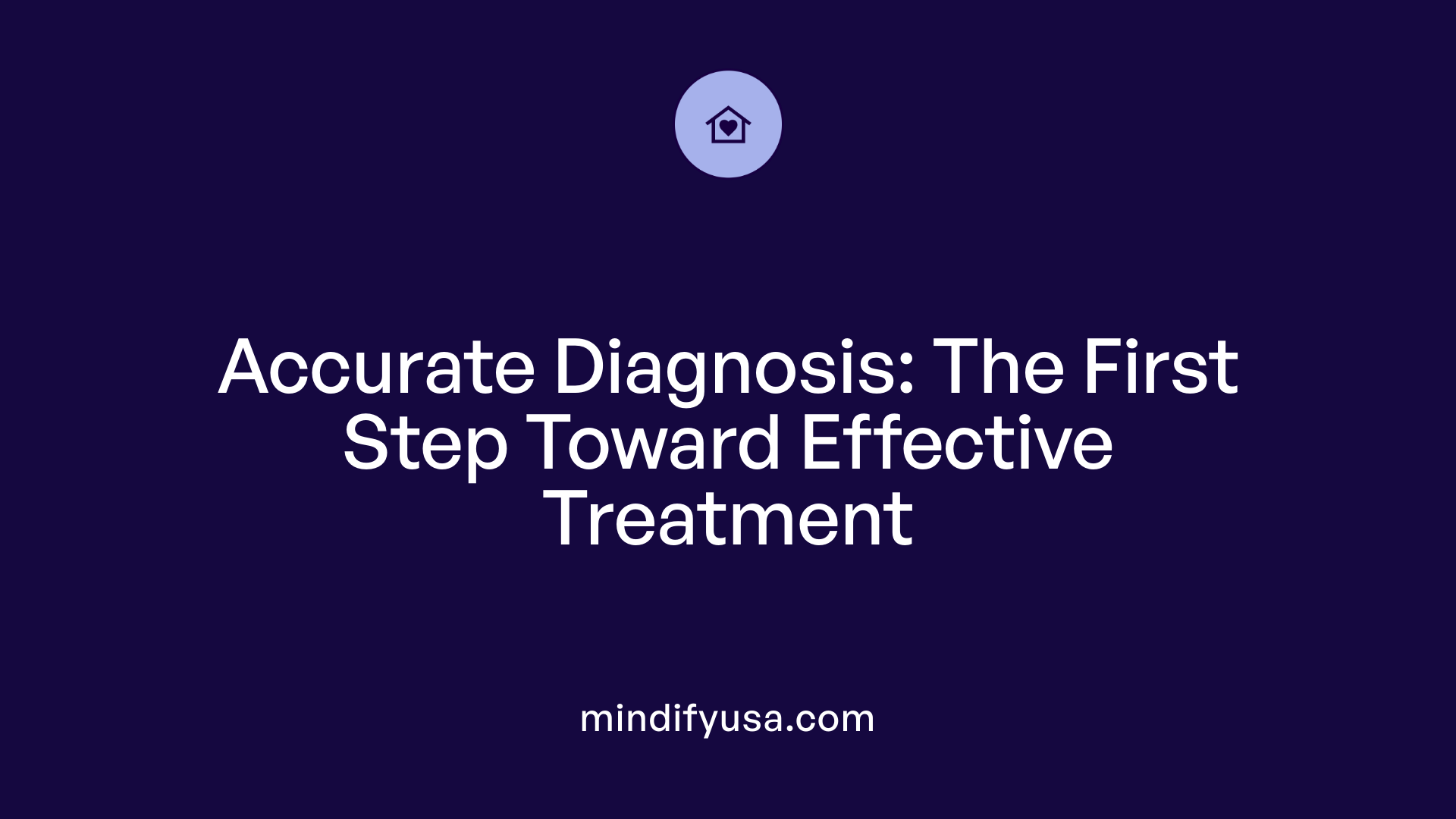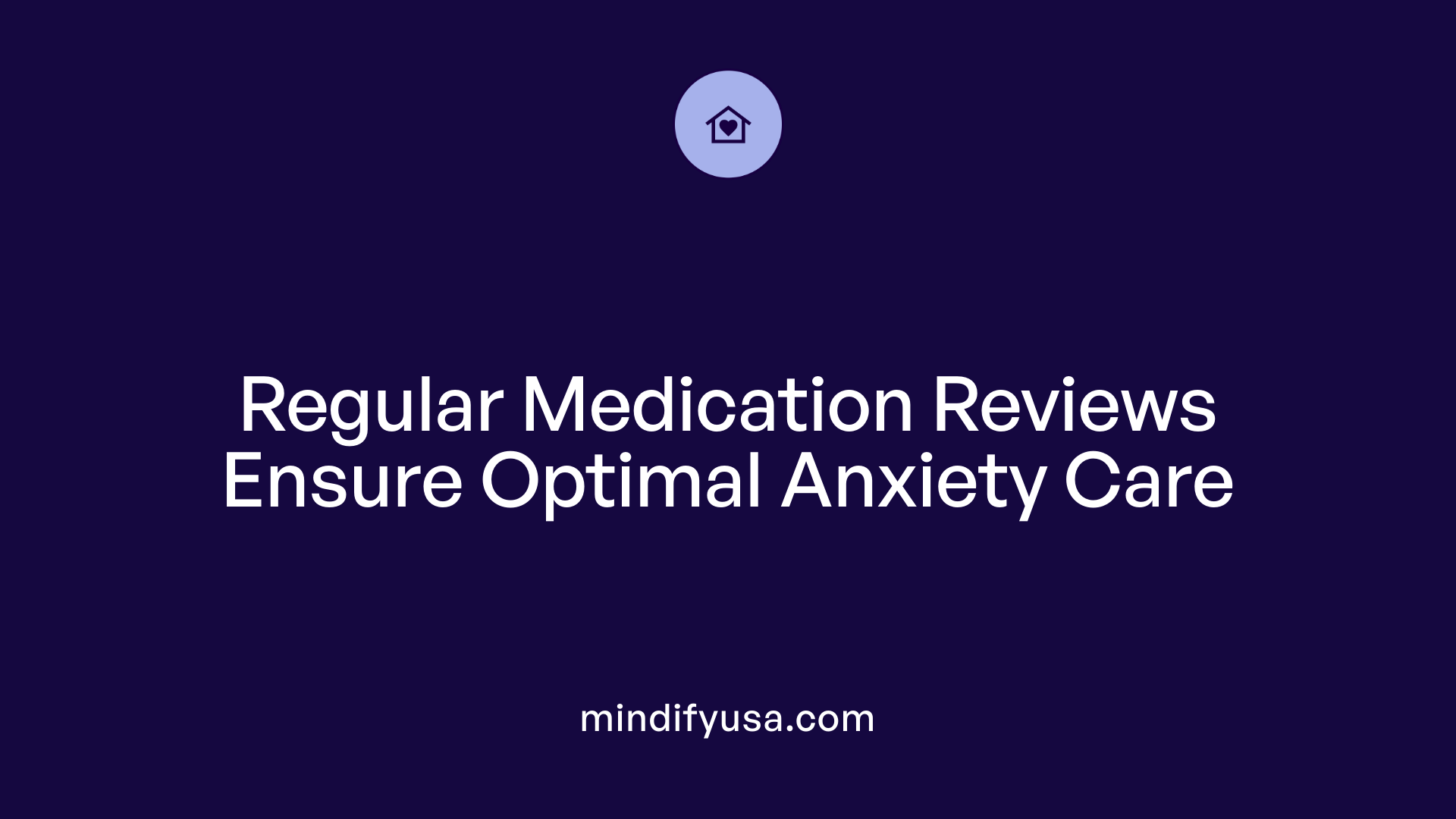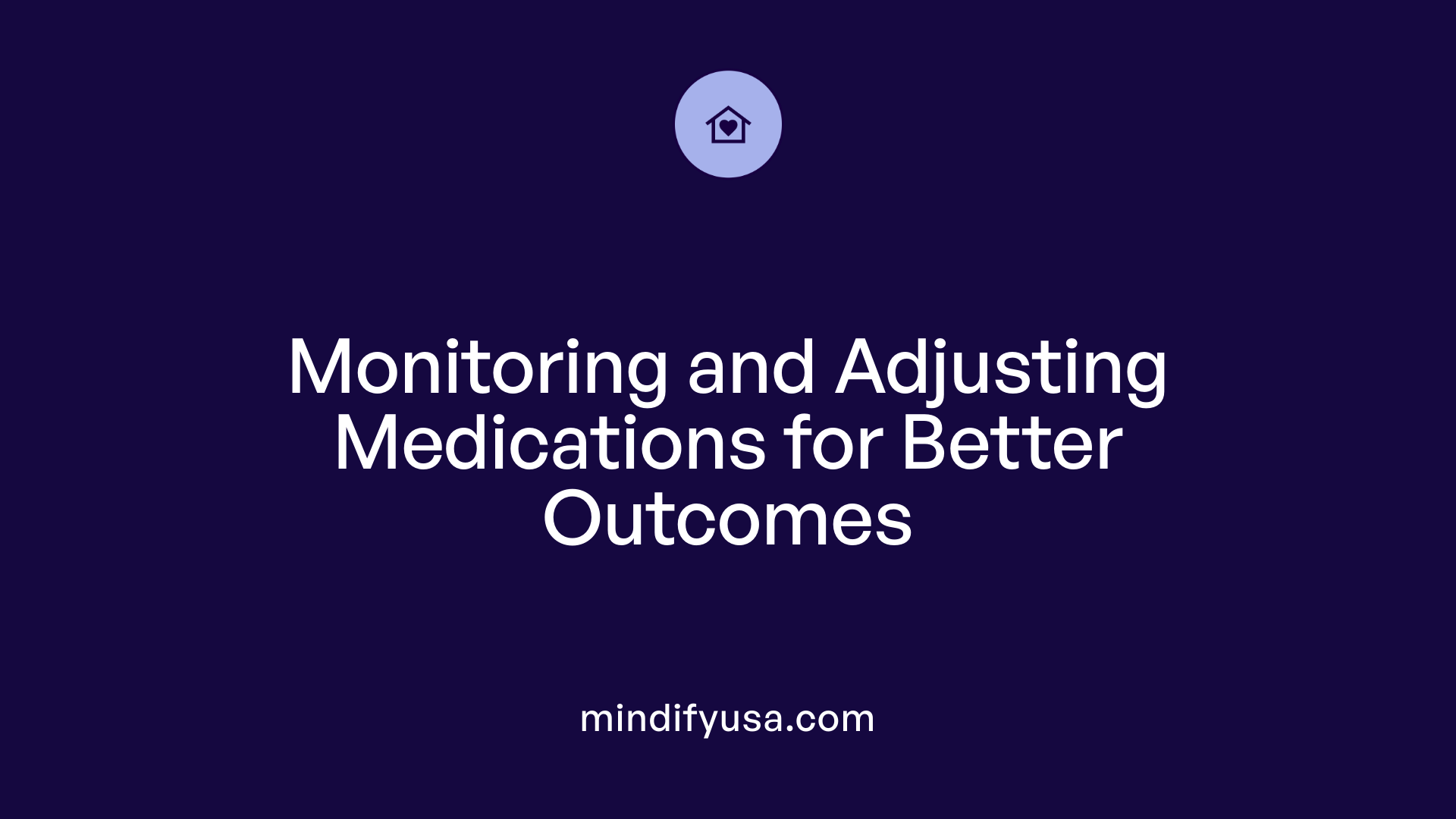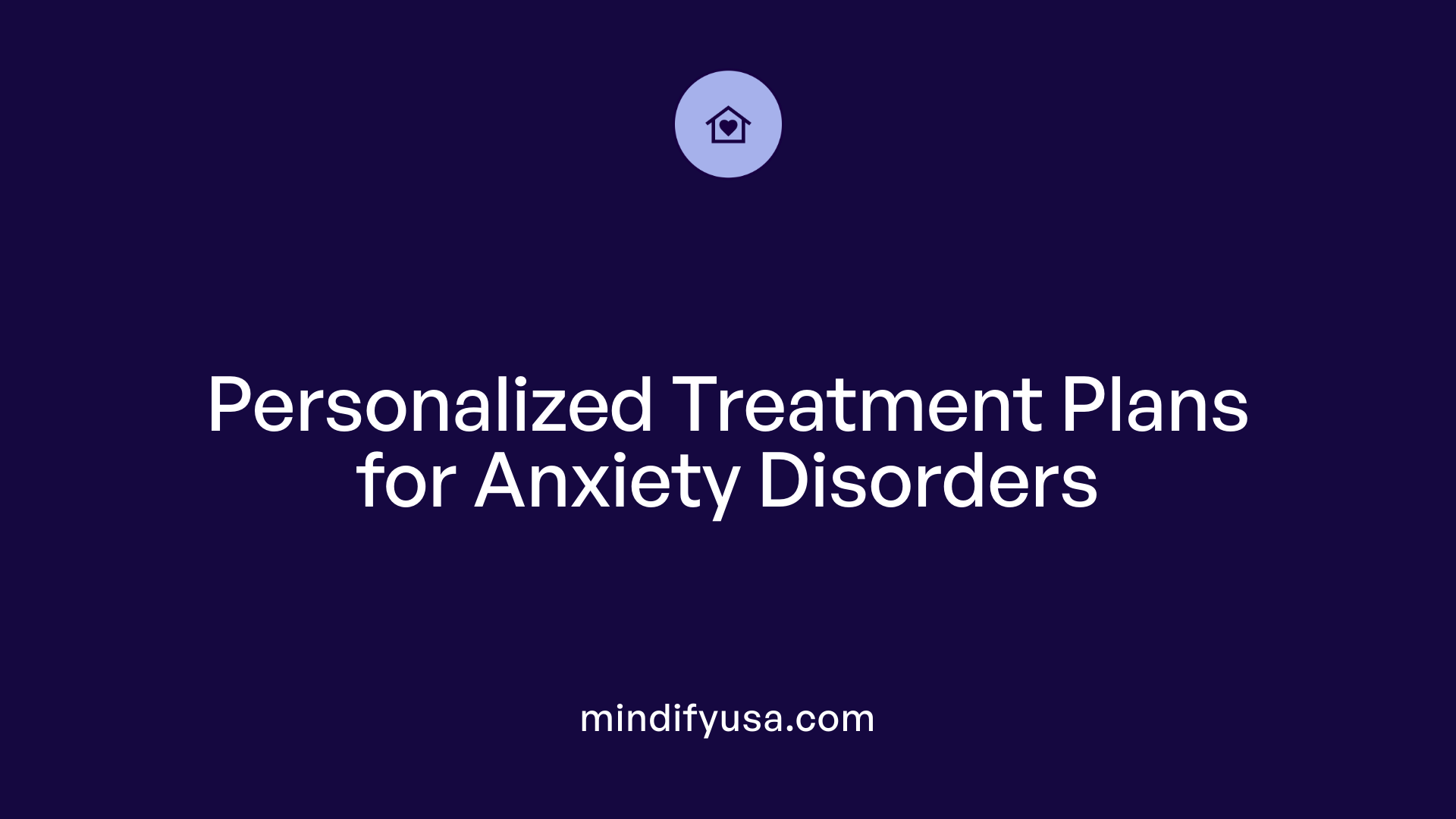Understanding the Importance of a Structured Medication Review in Anxiety Disorders
Managing anxiety disorders effectively requires a strategic approach to medication management. Central to this is the medication review process, a systematic, evidence-based procedure aimed at ensuring that treatment remains effective, safe, and tailored to each patient's evolving needs. This article explores the intricacies of medication review, encompassing initial diagnosis, selection of pharmacotherapy, ongoing monitoring, and adjustment strategies, with a focus on reducing anxiety symptoms and improving overall quality of life.
Common Pharmacological Treatments for Anxiety Disorders

What are the most common pharmacological treatments for anxiety disorders?
The main medications prescribed for anxiety disorders are selected based on their efficacy and safety profiles. Among these, selective serotonin reuptake inhibitors (SSRIs) such as escitalopram, sertraline, and paroxetine are considered first-line options. They are favored because they effectively reduce symptoms and are well tolerated by most patients.
Serotonin-norepinephrine reuptake inhibitors (SNRIs), like duloxetine and venlafaxine, are also widely used, especially for generalized anxiety disorder (GAD). These drugs work by balancing additional neurotransmitters in the brain, providing relief from anxiety.
Benzodiazepines, including alprazolam and diazepam, are effective for rapid symptom relief. However, they are recommended only for short-term use due to risks of dependence and tolerance.
Another medication approved for anxiety is buspirone, which is often used for GAD. It provides a non-sedating option and carries fewer concerns about dependency.
In addition to these mainstays, certain anticonvulsants like pregabalin have shown strong evidence of effectiveness. Beta-blockers can help manage physical symptoms such as rapid heartbeat or trembling, especially in social anxiety or performance situations.
Ongoing research and clinical trials are investigating other agents and novel pathways, but current best practices rely on SSRIs and SNRIs for the majority of cases. It is crucial to tailor treatment choices to individual patient needs and monitor response regularly.
Future Directions and Considerations
The field is continuously evolving, with new neuroreceptor-targeted drugs and neurochemical modulation approaches under study. The goal is to develop medications with greater specificity, fewer side effects, and improved efficacy.
Overall, medication treatment will often be combined with psychotherapy, such as cognitive-behavioral therapy (CBT), to maximize benefit and support long-term management of anxiety disorders.
For detailed treatment planning, healthcare professionals should consider patient history, comorbidities, and personal preferences to select the most appropriate medication and dosing schedule.
Diagnosis and Evaluation for Anxiety Medication
 When considering medication for anxiety, proper diagnosis and thorough evaluation are essential steps to ensure effective and safe treatment. Initially, the process begins with an appointment with a healthcare professional, such as a primary care doctor, psychiatrist, or psychiatric nurse practitioner. During this consultation, the provider carefully reviews your symptoms, medical history, and any current medications or treatments.
When considering medication for anxiety, proper diagnosis and thorough evaluation are essential steps to ensure effective and safe treatment. Initially, the process begins with an appointment with a healthcare professional, such as a primary care doctor, psychiatrist, or psychiatric nurse practitioner. During this consultation, the provider carefully reviews your symptoms, medical history, and any current medications or treatments.
A detailed interview or assessment is typically conducted to understand the severity and impact of your anxiety, along with identifying possible triggers. It’s important to be honest about your experiences, including any family history of mental health issues, substance use, or previous treatments.
Healthcare professionals also utilize various diagnostic tools to aid in their assessment. Commonly used scales for evaluation include the GAD-7 (Generalized Anxiety Disorder 7-item scale), Penn State Worry Questionnaire, and other structured interviews. These tools help quantify symptoms and track changes over time.
Once the evaluation is complete, the healthcare provider makes a diagnosis, such as generalized anxiety disorder (GAD), panic disorder, or social anxiety disorder. Based on this diagnosis, they may recommend behavioral therapies, medications, or a combination of both. When medication is indicated, only qualified providers can prescribe it, and they will tailor treatment choices to your specific symptoms, health status, and preferences.
This comprehensive assessment and diagnosis process ensures that any pharmacological intervention is appropriate and optimized for your individual needs, supporting better outcomes and minimizing risks.
Role of Medication Review in Anxiety Management

What is the role of medication review in managing anxiety symptoms?
Medication review is a vital component of effective anxiety treatment, serving as an ongoing process to evaluate how well medications are working and to ensure patient safety. Regular assessments help healthcare providers determine if symptoms are improving, remaining stable, or worsening, and whether any side effects are present.
Through careful monitoring, clinicians can decide if dosage adjustments are needed, or if switching or augmenting medications would benefit the patient. For example, if a patient shows only partial response to SSRIs or SNRIs, further adjustments or additional drugs like atypical antipsychotics or other agents may be considered.
Personalized treatment plans are crafted based on individual responses, side effect profiles, and preferences. This tailored approach increases the likelihood of symptom remission and minimizes adverse effects.
Furthermore, medication review enables the safe integration of new therapies under investigation, such as neuropeptides or glutamate modulators, into existing treatment regimes.
Overall, systematic medication review fosters a dynamic, evidence-based strategy that adapts to patients' changing needs, aiming to achieve optimal control of anxiety symptoms while reducing risks associated with long-term medication use.
Monitoring and Adjusting Anxiety Medications

What are evidence-based approaches to monitoring and adjusting medications for anxiety?
Effective management of anxiety medications involves systematic and ongoing assessment of how well the treatment is working. Clinicians commonly utilize validated scales such as the Hamilton Anxiety Scale (HAM-A), Liebowitz Social Anxiety Scale (LSAS), or Panic and Agoraphobia Scale (PAS) to quantify symptom severity and track changes over time. These tools help determine whether the medication is providing the desired relief.
Medications like SSRIs and SNRIs are usually titrated gradually, often over a period of 4 to 6 weeks. This slow dosage increase allows for careful observation of efficacy and potential side effects, ensuring patient safety and comfort. The goal is to reach an optimal dose that minimizes symptoms while limiting adverse effects.
Following initial improvement, clinicians should continue monitoring periodically for at least 12 months after remission to prevent relapse. During follow-up visits, it’s essential to evaluate for side effects, tolerability issues, signs of dependence—particularly with benzodiazepines—and adherence to the prescribed regimen.
Adjustments to treatment are made based on these evaluations. If there is insufficient response, options include increasing the dose within recommended limits, switching to a different medication within the same class, or augmenting the primary treatment with additional agents like pregabalin or buspirone, following clinical guidelines.
Combining pharmacotherapy with evidence-based psychotherapy, especially cognitive-behavioral therapy (CBT), can significantly enhance treatment outcomes. Personalizing treatment plans to suit individual patient needs and response patterns is an essential part of this process.
In summary, a structured, evidence-based approach involving validated measurement, cautious titration, thorough monitoring, and flexibility to modify treatment is crucial for effective management of anxiety medications.
Personalized and Evidence-Based Treatment Strategies

How can healthcare providers evaluate and review medications to optimize treatment of anxiety?
Healthcare providers use a systematic approach to evaluate and review medications for anxiety. Initially, they assess symptom response within 6 to 12 weeks of treatment initiation, monitoring both the effectiveness and any adverse effects. Based on these observations, they may adjust doses gradually, switch medications, or add augmentation agents such as atypical antipsychotics if the response is partial or absent.
The process involves continuous monitoring of symptom severity, side effects, and patient adherence, often utilizing validated tools like the GAD-7 or PHQ-9 for structured assessment. Providers consider evidence-based guidelines favoring SSRIs, SNRIs, and newer agents like pregabalin for specific disorders. Long-term management includes maintaining effective treatment for at least 12 months post-remission to prevent relapse, with careful plans for tapering when discontinuing medications.
In addition to pharmacotherapy, integrating psychological therapies such as cognitive-behavioral therapy (CBT) and lifestyle modifications like increased physical activity enhances treatment outcomes. Regular follow-ups enable tailored adjustments suited to individual needs, including special populations like pregnant women or those with comorbidities.
Ongoing research and emerging therapies, such as drugs targeting neuroreceptors or modulating learning and memory processes, promise future options tailored to specific neurobiological pathways. Clinical trials, including designs like SMART, help elucidate optimal treatment sequences, ensuring that medication review remains an evolving process grounded in current scientific understanding.
Emerging Pharmacotherapies for Anxiety Disorders
What is the role of medication review in managing anxiety symptoms?
Medication review is vital in treating anxiety disorders because it helps ensure that each patient receives the most effective and safest treatment possible. Regularly evaluating the response to medication allows healthcare providers to identify whether the treatment is working well, causing side effects, or needs adjustments.
This process involves assessing symptom improvement, managing adverse effects, and deciding whether to increase doses, switch medications, or add other drugs. Since many patients do not respond fully to first-line treatments like SSRIs or SNRIs, ongoing review enables a personalized approach, adapting treatment plans to individual needs.
Furthermore, medication review supports the integration of new and experimental drugs as research advances. For example, novel agents that target specific neuroreceptors or neural pathways are under investigation, though they require careful assessment of their effectiveness.
Overall, systematic medication review ensures a flexible, evidence-based management strategy aimed at optimizing outcomes and reducing the burden of anxiety symptoms.
Summary and Future Perspectives on Anxiety Treatment
How can healthcare providers evaluate and review medications to optimize treatment of anxiety?
Healthcare providers play a crucial role in ensuring that pharmacological treatment for anxiety is both effective and safe. They regularly evaluate patient response through systematic assessments of symptom severity, side effects, and overall well-being. Using validated tools like the GAD-7 or PHQ-9 helps quantify anxiety levels and track changes over time.
The medication review process involves carefully titrating doses, considering discontinuation strategies, and making adjustments based on individual responses. First-line medications such as SSRIs and SNRIs are typically prescribed, with gradual dose increases to minimize side effects and enhance tolerability.
Long-term management often requires ongoing monitoring for 6 to 12 months or more, particularly to prevent relapse after initial symptom remission. During this period, clinicians assess for adverse effects, patient adherence, and any need for augmentation or switching medications.
In addition to pharmacotherapy, integrating non-pharmacological treatments like cognitive-behavioral therapy (CBT), lifestyle modifications, and stress management techniques enhances treatment success. Special attention should be given to populations with comorbidities or those vulnerable to medication side effects.
Patient education about the importance of medication adherence, potential side effects, and the need for regular follow-up is essential. Personalized treatment plans are developed, often supported by clinical trials and evidence-based guidelines, to cater to individual needs and maximize benefits.
Looking ahead, research continues to explore novel agents and mechanisms, aiming to improve efficacy, reduce side effects, and tailor treatments based on genetic and neurobiological profiles. Technologies such as SMART trials are paving the way for more personalized medicine, optimizing pharmacotherapy strategies and improving quality of life for individuals with anxiety disorders.
Conclusion: The Continuous Journey of Anxiety Management
Effective management of anxiety symptoms hinges on a comprehensive medication review process that is iterative, personalized, and grounded in current evidence-based practices. As treatment options evolve with ongoing research into novel pharmacotherapies, healthcare providers must stay vigilant in assessing treatment response, adjusting therapies, and integrating non-pharmacological approaches. The goal remains to achieve remission, minimize side effects, and enhance quality of life. The future of anxiety treatment lies in personalized medicine, innovative drugs, and a holistic approach that combines medication review with psychotherapy and lifestyle modifications, ensuring that each patient receives optimal care tailored to their unique journey toward better mental health.
References
- Pharmacological treatment of anxiety disorders - PubMed Central
- Anxiety disorders - Diagnosis and treatment - Mayo Clinic
- Pharmacotherapy for Depression and Anxiety in the Primary Care ...
- Diagnosis and Management of Generalized Anxiety Disorder ... - AAFP
- Pharmacotherapy of Anxiety Disorders: Current and Emerging ...
- What doctors wish patients knew about managing anxiety disorders
- Anxiety Disorders Treatment & Management - Medscape Reference
- Pharmacotherapy for Anxiety Disorders: From First-Line Options to ...






































































































